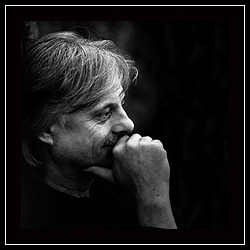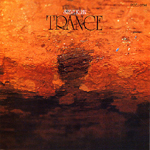|
|
 |

|
 |
Dusted Features
Three recent reissues uncover evolutionary evidence of the ECM sound: Dave Holland & Barre Phillips' Music From Two Basses, Steve Kuhn's Trance and Julian Priester's Love, Love.
|
|
|
 |
Early Bricks in the House of Eicher
In Darwinian terms, four decades registers as barely a sliver on the evolutionary yardstick. But in the life of a recording label that span of time can chart considerable changes. ECM is a handy example of this sort of historical continuum. Owner and producer Manfred Eicher’s roots in 1960s European free improvisation gave rise to tributaries into fusion and free jazz. Today the imprint carries an international reputation for high quality jazz and modern classical music steeped in austere audiophile sound and strong production values. The shift is by no means a hermetic one, as ongoing releases by Evan Parker’s Electro-Acoustic Ensemble, the Maneris (Joe and Mat) and others prove. But much of the early back catalog has fallen out of print, taking with it ECM’s pioneering ties to edgier fare. Three new reissues achieve significant strides in repairing such attrition, and in so doing offer up an eclectic sampler of the label’s younger years.

Dave Holland and Barre Phillips were among the vanguard of young turks who took the lessons of Mingus and Pettiford to whole new degrees of virtuosity. An Englishman by birth, Holland established his stature through high profile posts with the late 1960s bands of Miles Davis and Chick Corea. Phillips, an expatriate American, cultivated his chops as a sideman with Archie Shepp and Mal Waldron. Considering their comparatively parallel paths of development the pair’s ground-breaking conclave on Music From Two Basses makes perfect sense. The album, as far as I’m aware the first of its kind, makes good on the promise of its title, deviating slightly as Holland also brings cello to the party along with his upright. Parsed neatly into separate stereo channels both men operate in blemish-free fidelity that stands as precursor of the pristine ECM sound so widely touted today.
Two generically-titled improvised pieces fill out Side A of the original LP. On the first, Holland and Phillips cover the totality of their basses, building dense cross-patterns of brittle plucks and booming, bottom-dwelling strums. All the activity smoothes out unexpectedly into a tandem melodic exploration steeped in somber tonal hues. Five shorter pieces occupying Side B accord variety, but some feel more like experiments in environmental mimesis than finished products. The coruscating layered harmonics of “Beans” mimic fathoms-deep whale song. Percussive pizzicato patterns on “Rain Drops” resemble the patter of precipitation on a corrugated aluminum roof.
On “May Be I Can Sing it For You” a mournful arco line juxtaposes against a galloping ostinato for a mere minute and change. The closing “Song for Clare” employs the same basic strategy, this time with a delicate dose of melody added to create a particularly potent ballad blend. Over the years players like William Parker, Peter Kowald and Joëlle Léandre have extended the tradition with teamings of their own. Considering the breadth of what’s come after, it’s a pleasure to have this granddaddy session returned to circulation, not showing the slightest indication of old age or obsolescence.

Pianist Steve Kuhn is another player who came of age as an improviser through sideman work with impressive employers like Stan Getz and John Coltrane. Recorded in 1974, Trance finds him delving creatively into modal fusion with a small combo comprised of Steve Swallow, Jack DeJohnette and percussionist Sue Evans. Swallow had made the controversial switch to electric bass several years earlier and DeJohnette was enjoying notoriety as a top-tier drummer on the New York scene. Evans serves mainly as embellisher and colorist. The four establish a melody-rich exploratory vibe right from the start. Acoustic and electric piano weave in a lush serpentine braid on the title cut, flanked by DeJohnette’s textured cymbal and tom-tom washes and the steady pulse of Swallow’s turgid strings.
Later pieces embrace a broad stylistic swathe, from the shimmering Rhodes-fueled reveries of “A Change of Face” and “Something Everywhere” that build momentum on bubbling Bossa rhythms and fleshy sprinting Swallow runs to the straight-up cocktail funk of “The Young Blade,” again benefiting from the earthy backbeat accord of Kuhn’s rhythm mates. “Squirt” sounds like a borrowing from the early-Jarrett songbook, mixing rock structures with a protracted segue into free-form scaling up tension, while the solo “Silver” spotlights the leader’s rhapsodic side through grand swelling gestures leavened by gentle strolling chords. The set’s capper “Life’s Backward Glance” is an oddity, with Kuhn reciting what sounds like a stanza from Coleridge’s Rime of the Ancient Mariner to sparse accompaniment. The album makes a strong case for the debt owed by such new millennial outfits as Medeski, Martin and Wood and Soulive. Kuhn was cutting juicy forward-thinking grooves when the musicians in those bands were still eating sugared cereal and watching Saturday morning cartoons.

Also dating from 1974, Julian Priester’s Love, Love hasn’t aged nearly as well. At the time of taping, the trombonist was in the midst of an Afrocentric phase, fresh out of a productive membership in Herbie Hancock’s Mwandishi sextet. The fusion propensities of that band and others including Weather Report and Miles Davis’s contemporaneous electric troupes feed directly into the album’s umbrella aesthetic. But it’s a vibe that also draws on vaguely metaphysical trappings, including cover art that recalls Jonathan Livingston Seagull. Priester assembles octet and sextet ensembles out of a core roster of ten players that includes such session men as bassist Henry Franklin and synthesist Patrick Gleeson. The second, more funk-oriented, grouping only appears on the title piece, a nearly 20 minute one-chord jam balanced monotonously on Ron McClure’s bulbous electric bass vamp. Many of the players adopt African cognomens like Ndugu and Nyimbo to further convey a blending of ethnic and technological leanings. Priester himself doubles on horns, whistle flute, percussion and synthesizers.
Structured as a five-part suite and sectioned into two side-long tracks, the music is mostly awash in a frothing sea of synthesizers and electronics. Only during the final fourth of the program do these elements recede and allow the horns and rhythm to adhere to more clearly organized and emboldened orchestral architectures. Prior to this late reprieve, solos are uniformly brief and at least partially buried by the heavy production and mix. The set concludes as the band appears to have shaken off shared preoccupations with stultifying navel-gazing and is just hitting stride. But the album’s most egregious aspect is that Priester and company opt not to hang much of memorable worth on the sizeable slabs of groove and atmosphere characteristic of earlier segments. The leader’s sizeable skills on his main instrument are lost for much of the duration, subsumed under swirling tonal watercolors and seemingly endlessly repeating rhythmic whirlpools. When he does surface towards the end, his improvisations and those of others like talented bass clarinetist Hadley Caliman aren’t enough to stem the prevailing tide of over-production and under-execution. Two hits and one miss, these three discs are hopefully the first in a continuing effort to return ECM’s storied back catalog to long-overdue recirculation.
By Derek Taylor
|







